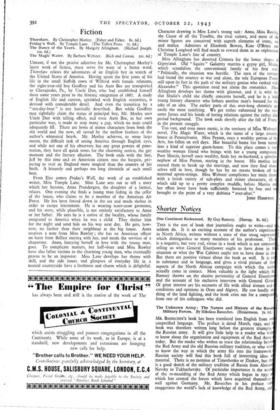Fiction Thorofare. By Christopher Morley. (Faber and Falter. 8s. 6d.)
Friday's Well. By Temple Lane. (The Talbot Press. 7s. 6d.) The Dance of the Years. By Margery Allingham. (Michael Joseph.
los. 6d.) The Magic Water. By Barbara Webster. (Rich and Cowan. ios. 6d.)
URBANE, if not the precise adjective for Mr. Christopher Morley's latest work of fiction, must serve for want of a better word. Thorofare relates the adventures of an English boy in search of the United States of America. Having spent the first years of his life in the small Suffolk town of Wilford with female relations, the eight-year-old boy Geoffrey and his Aunt Bee are transported to Chesapeake, Pa., by Uncle Dan, who had established himself there some years prior to the historic emigration of 1887. A study of English life and custom, sprinkled with English eccentrics, is devised with considerable detail. And even the transiticn by a " ten-day-boat " is not hurriedly described. , But while Geoffrey may rightfully claim the status of principal boy, Mr. Morley uses Uncle Dan with telling effect, and even Aunt Bee, in her own particular way, is made to stop many a gap, which no male could adequately fill. There are hosts of minor characters from both the old world and the new, all tarred by the mellow feathers of the author's whimsical brush. Mr. Morley achieves, to some large extent, the difficult task of seeing America through English eyes, and while not one of his observers has any great powers of pene- tration, they have all quick noses for .the charming notion, the gay moment and the literary allusion. The book ends with the boy, Jeff by this time and an American citizen into the bargain, pre- paring to visit an England more magical than the country of his birth. A leisurely and perhaps too long chronicle of such small beer.
From Eire comes Friday's Well, the work of an established writer, Miss Temple Lane. Miss Lane sets out to tell a story which her heroine, Anna Prendergast, the daughter of a farmer, relates. One evening she finds a young man hiding in the cellar of the house, who claims to be a member of the American Air Force. He has been forced down in the sea and needs shelter in order to escape internment. He is wearing scare-crow garments, and his story, while plausible, is not entirely satisfactory to Anna or her father. He says he is a native of the locality, whose family emigrated to America when he was a child. They shelter him for the night and send Win on his way next day. He gets, how- ever, no farther than their neighbour at the big house. Anna receives a note from Miss Rawley ; she has an American officer on leave from Belfast stayin3 with her, and needs the services of a chaperone. Anna, fancying herself in love with the young man, goes. To complicate matters, her half-sister and Miss Rawley have also fallen victims to the charming young man, who eventually proves to be an impostor. Miss Lane develops her theme with skill, and the side issues and glimpses of everyday life in a neutral countryside have a freshness and charm which is delightful.
Character drawing is Miss Lane's strong suit: Anna, Miss Rawley, the Cause of all the Trouble, the rival suitors, and most of the minor figures are conceived with superb elements of irony, wit and malice. Admirers of Elizabeth Bowen, Kate O'Brien and Christine Longford will find much to reward them in an eiploration of Temple Lane's line of country.
Miss Allingham has deserted Crimera for the lower slopes of Gipsyland. Old " Squire " Galantry marries a gypsy girl, Shull; which scandalises the conventional family of his first wife. "Politically, the situation was horrific. The turn of the century had found the country at war and alone, the sole European Power still upon its feet in the path of the military genius• who ranked with Alexander." This quotation need not alarm the romantics. Miss Allingham develops her theme with glamour, and it is with the slut Shulie's child she chiefly concerns herself, and he is a bold young literary character who fathers another man's bastard for the sake of an idea. The earlier parts of this over-long chronicle are easily the most satisfying. We get rather exhausted by the tire- some James and his horde of boring relations against the rather dim period background. The book ends shortly after the fall of France in the present struggle.
Too vast, and even more exotic, is the territory of Miss Webster's novel, The Magic Water, which is the name of a large country house in Pennsylvania. Miss Peyton, once a wealthy patron of the Arts, has fallen on evil days. Her beautiful home has been turned into a kind of superior guest-house. To this place comes a very wealthy woman friend who brings with her a young companion. Poor Marcia, herself once wealthy, finds her ex-husband, a spineless nephew of Miss Peyton, staying in the house. His mother had caused them to break up the marriage, and now they find them- selves still in love, though he has by no means. broken off the maternal apron-strings. Miss Webster complicates her main theme with a lavish variety of sub-plots and minor characters, all which add up to a pretty complex muddle, before Marcia an her effete lover have been sufficiently battered by fate and a brought to the point of a very dubious " ever-after."
JOHN HAMPSON.


























 Previous page
Previous page